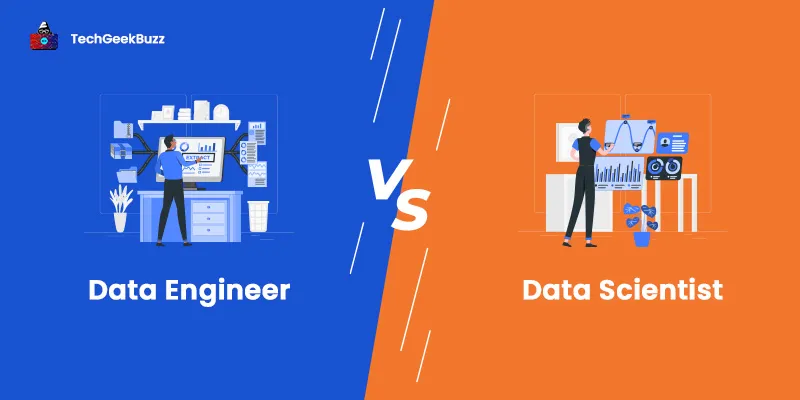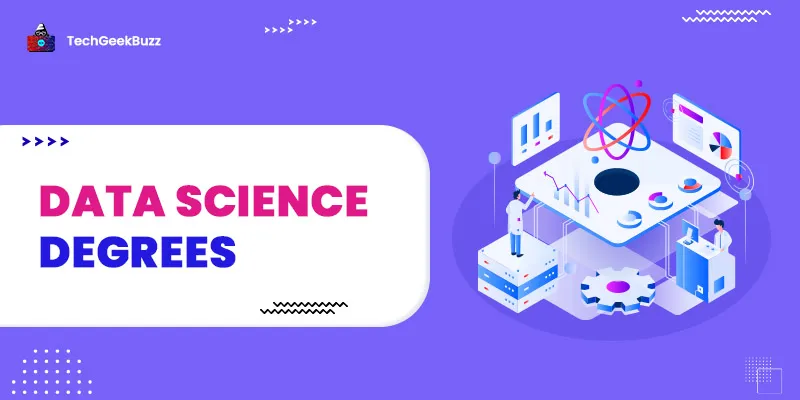The amount of data generated every day is overwhelming, and storing such vast amounts of data is pretty challenging. Also, converting raw or unstructured data into usable information is essential to derive meaningful information. To make this happen, data engineering comes into play.
Data engineering is a branch of computer science that focuses on collecting, storing, managing, and converting raw or unstructured data into usable information. In other words, we can say that data engineering entails maintaining the data pipeline of an organization and cleaning data to make it usable for deriving useful insights.
A professional who is responsible for carrying out data engineering practices in organizations is a data engineer. As today's businesses rely heavily on data, they need data engineers to manage their data pipelines and turn raw data into useful information. Therefore, data engineers are in great demand today.
If you aspire to pursue your career as a data engineer but do not have any idea of the process for becoming a data engineer, you have landed at the right place.
This blog post aims to provide you with a step-by-step guide to becoming a proficient data engineer. Also, it sheds light on who a data engineer is, along with the roles and responsibilities, job opportunities, and salary of a data engineer.
So, here it goes!
Who is a Data Engineer?
A data engineer is an IT professional whose primary responsibility is to prepare data in a specific format required for analytical or operational purposes. They are responsible for building and maintaining data pipelines that combine data from different sources. They integrate, clean, and structure data for analytical purposes.
Data analysts and data scientists work in conjunction with data engineers. They use the data prepared by data engineers to extract valuable insights, which, in turn, helps organizations make more informed decisions.
Therefore, the ultimate goal of a data engineer is to make data available to organizations, improve their big data ecosystem, and assist them in making informed business decisions.
Roles and Responsibilities of a Data Engineer
Data engineers fall under the three major roles as follows:
1. Generalists
Generalists are data engineers who primarily work with small teams or small organizations. They are responsible for performing every step involved in processing raw data, from collecting and managing data to analyzing it. This role is the best fit for data scientists who wish to become data engineers.
2. Pipeline-Centric Engineers
Pipeline-centric Engineers are data engineers who majorly work with mid-size teams or organizations. They work with data scientists to make the most out of the collected data. Moreover, these engineers should possess profound knowledge of data science and distributed systems.
3. Database-Centric Engineers
Database-centric engineers are data engineers who work in large organizations that distribute their data across several databases . They are responsible for implementing, maintaining, and populating analytics databases. In addition, they modify databases for efficient analysis, manage data pipelines, and leverage ETL (Extract Load Transform) to create table schemas.
Data Engineer Responsibilities
As discussed earlier, data engineers collect and prepare data that data scientists and analysts use to find new trends and derive insights. Besides this, they also have many other responsibilities, as given below:
- Collect raw or unstructured information from heterogeneous sources.
- Analyze and organize raw and unstructured data.
- Build data pipelines and systems.
- Analyze business requirements and goals.
- Understand trends and patterns in data.
- Prepare data for use by data scientists for perspective and predictive modeling.
- Carry out analysis on complex data and prepare the report of the results.
- Find out different ways to improve data quality and reliability.
- Automate mundane tasks.
- Develop efficient algorithms and machine learning techniques for research and project purposes.
How to Become a Data Engineer?
The role of data engineers is highly technical. Therefore, to become a data engineer, one has to possess various skills. Along with essential skills, it is important to hold a bachelor’s degree. Also, holding a data engineer certification would be the cherry on the cake.
Following are some key steps for becoming a data engineer:
1. Earn a Bachelor’s Degree
The first step to becoming a data engineer is to hold a bachelor’s degree in computer science, applied mathematics, physics, statistics, or any other related field. Along with a degree, it is recommended to pursue an internship to gain real-world experience for various entry-level data engineer positions.
2. Develop Data Engineer Skills
As discussed above, you need to develop a set of skills to become a skilled data engineer. These skills include:
-
Programming Languages
Since Python plays a vital role in the data science domain, it is essential for you to learn Python programming . As you move on to master Python, you can then learn the R language. Along with Python and R, you should also develop a basic understanding of C#, Java, Ruby, and Scala.
-
Operating Systems
Another fundamental skill that every data engineer should possess is in-depth knowledge and hands-on experience working with various operating systems, including Windows, macOS, Linux, Solaris, and UNIX.
-
Big Data Frameworks
Data engineers should have hands-on experience dealing with big data frameworks because they are responsible for storing and analyzing large amounts of data. Apache Spark, Hadoop, Apache Hive, MapReduce, and HBase are some of the most prominent big data frameworks . Data engineers are in charge of evaluating various frameworks and choosing the one that best meets their requirements.
-
Database Management Systems
A thorough understanding of database management systems is also required for data engineers. They mostly prefer Oracle and MySQL. Data engineers should be well-versed in creating SQL queries to handle data, as both are relational database management systems. Besides writing SQL queries, they should also focus on database design, performance, capacity, security, backup options, failover, and recovery.
-
NoSQL Databases
Along with structured data, data engineers are also responsible for managing raw and unstructured data. For this reason, they need to have a solid understanding of NoSQL databases, like MongoDB and CouchBase. These databases store and manage unstructured data in a format other than relational databases .
-
ETL (Extract Load Transform)
ETL (Extract Load Transform) tools combine data from various sources and load it into a single and consistent data warehouse or any other target system. They also help in cleaning data that we can use for advanced analytics. Therefore, data engineers need to have knowledge of using ETL tools.
-
Machine Learning
Having a basic understanding of machine learning would be beneficial for data engineers. They would be able to understand how data scientists use data for statistical analysis and data modeling.
-
Cloud Computing
Since traditional database management systems are not enough to store massive amounts of data, organizations are shifting to the cloud. Therefore, data engineers should have a basic understanding of cloud computing and cloud service providers, like AWS and Microsoft Azure.
3. Get Certified
Pursuing a certification in data engineering boosts the chances of landing a job. You can validate your data engineering expertise to potential employers. Also, certification exams are the best way to develop in-depth knowledge and skills.
A plethora of data engineer certifications is available on the internet. Here are some popular data engineer certifications:
-
IBM Certified Data Engineer - Big Data
This certification is one of the most in-demand certifications among aspirants desiring to become certified data engineers. It validates an individual’s expertise in building large data processing systems and solving real-world big data problems.
To earn this certification, one has to appear for an examination, which consists of multiple-choice questions divided into five different sections.
-
Google Professional Data Engineer
This data engineer certification tests individuals for their abilities to design, build, deploy, maintain, and monitor data processing systems. In addition, it validates candidates for their expertise in using, deploying, and training machine learning models.
One has to undergo a two-hour exam to earn this certification. The exam consists of multiple select and multiple-choice questions.
-
Cloudera Certified Professional (CCP) Data Engineer
This certification demonstrates an individual’s ability to optimize large datasets for a variety of workloads. Also, it helps them to understand various concepts, including data ingestion, transformation, storage, and analysis.
The certification exam is a scenario-based exam, where applicants are provided with large and complex unstructured datasets to solve them within the given limit.
-
Microsoft Certified: Azure Data Engineer Associate
Individuals who own this certification are able to integrate, clean, and turn unstructured and structured data into usable data for analytical purposes. They are also able to use Azure data services to monitor and maintain data storage, data processing, and data security.
To earn this certification, one has to appear for Exam DP-203: Data Engineering on Microsoft Azure.
4. Begin with an Entry-level Position
After you gain data engineer skills and pursue one of the certifications, you will be job-ready. You can start with an entry-level position, such as a database administrator or business intelligence analyst . These job roles will help you develop problem-solving and critical thinking skills.
Also, you will be able to learn how to work with a variety of datasets that you were not aware of earlier. In a nutshell, you will gain experience, which will be helpful in the future.
5. Earn a Master’s Degree
If you wish to hone your skills and advance your knowledge in the data engineering domain, pursuing a master’s degree is the best option. You will become a proficient and competitive data engineer candidate after earning your master's degree.
Data Engineer Jobs and Salary
With the rise in data generation, the demand for data engineers is increasing. The field of data engineering opens up a lot of career opportunities. You can work as a data engineer, senior data engineer, big data engineer, and senior cloud data engineer, among all other roles. Despite the fact that these jobs are pretty complicated, you will get a lot of useful knowledge.
Along with immense knowledge, another benefit of being a data engineer is sky-high salaries. The salary of data engineers entirely depends on the level of experience, location, and organization.
According to Indeed, the average salary of a data engineer in the USA is $119,459 per annum. However, the salary may range between $92,222 and $128,594, depending upon the experience and knowledge.
Netflix, a popular streaming service and production company, pays an average salary of $294,903 per year to senior data engineers. Moreover, Amazon pays an average salary of $103,849 per annum, while Facebook pays $122,695 per year to entry-level data engineers.
Conclusion
To work as a data engineer, you'll need a diverse set of skills as well as a bachelor's degree. Furthermore, getting a certification that verifies your data engineering knowledge might lead to a plethora of job opportunities.
Pursuing a master's degree in data engineering is a great way to expand your knowledge and abilities. However, before obtaining a master's degree, we recommend that you look for an entry-level data engineer position to gain some hands-on experience.
Good Luck!
People are also reading:





Leave a Comment on this Post